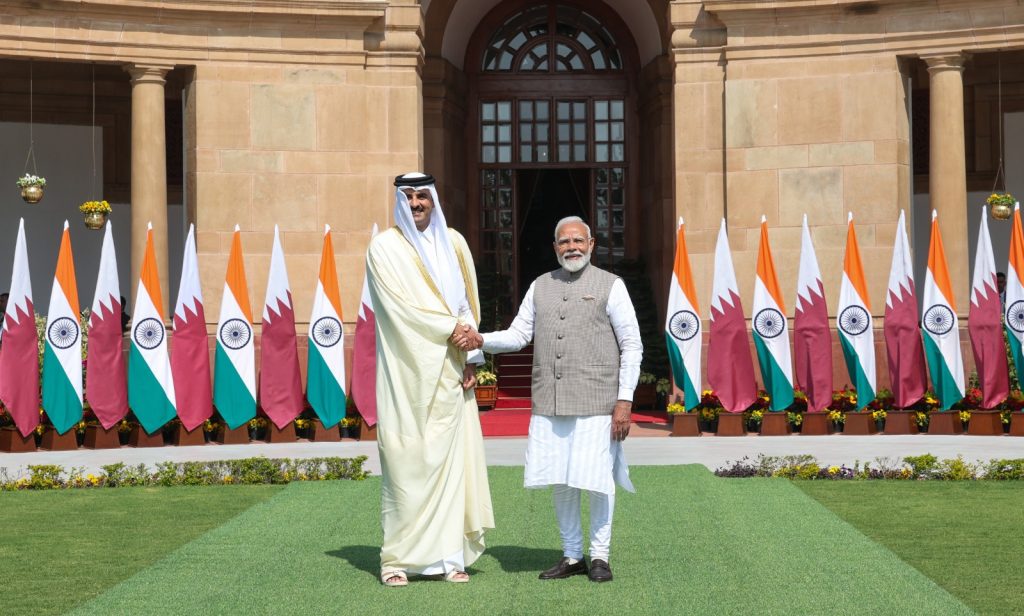When Qatar’s Emir Sheikh Tamim bin Hamad Al-Thani landed in New Delhi for a two-day visit, he didn’t receive the typical diplomatic welcome. Instead, in a rare departure from protocol, the Emir was personally greeted by Indian Prime Minister Narendra Modi at the Indira Gandhi International airport- a gesture signalling Qatar’s growing significance for India. A high-level delegation of ministers, officials, and business leaders accompanied the Qatari leader on his two-day visit from February 17 to February 18. The last time the Emir was in India was in March 2015, making this his second visit in nearly a decade.
The two countries have long shared a stable bilateral bond which has gained significant momentum in the past decade. The relationship suffered a setback in 2022 when eight former naval officers were sentenced to death in Qatar over charges of espionage, however, things improved when the Emir pardoned and released them in 2024, renewing diplomatic engagement. Since then, engagement has picked up significantly, with high-level exchanges underscoring the priority of this partnership. Energy continues to be the central theme of this relationship, but Qatar’s emergence as a strong regional player in West Asia is also playing a crucial factor in India’s approach.
The visit began with a ceremonial welcome for the Emir on February 18 at the Rashtrapati Bhavan after which he headed to Hyderabad House in New Delhi for a meeting with Prime Minister Modi. The leaders discussed a range of topics for cooperation including energy, trade, and investments.
This visit witnessed the signing of two significant agreements to boost bilateral ties. First, the two nations signed an agreement to elevate their ties to a strategic partnership paving the way for collaborations on new projects of mutual interest. Secondly, the two sides revised the agreement for the Avoidance of Double Taxation and the Prevention of Fiscal Evasion. This agreement is crucial as it simplifies tax frameworks creating a smoother operating environment for cross-border trade and business investments, providing an impetus for Qatari and Indian companies to expand operations in each other’s markets.
During the visit, several new domains of collaboration and cooperation, including food security, technology and startups, were also announced and the prospect of increasing Qatari investment in India was discussed.

Key highlights from the visit
- India and Qatar announced a bilateral comprehensive economic partnership agreement (CEPA) wherein they aim to double bilateral trade from $14 billion to $28 billion over the next five years. Indo-Qatar trade has largely been dominated by India’s heavy import of liquified natural gas (LNG) and Doha is New Delhi’s largest LNG supplier. This is likely to play a crucial role in boosting trade between the countries, with India’s LNG demand projected to rise significantly.
- Along with CEPA, they agreed to explore the possibility of a bilateral Free Trade Agreement which could completely or significantly reduce duties on a large share of goods traded between them. India is already negotiating an FTA with the Gulf Cooperation Council, of which Qatar is a member.
- On Foreign Direct Investment, Qatar announced a commitment to invest $10 billion in India across sectors like infrastructure, ports, shipbuilding, smart cities, food parks, start-ups and technologies, including artificial intelligence, robotics and machine learning. Currently, the Qatar Investment Authority has an estimated $1.5 billion FDI in India across retail, power, IT, health education etc. The new cash commitment marks a sharp uptick in FDI with the QIA planning to open an office in India to further promote Qatari investments.
- Five major MoUs were signed during the visit:
- MoU between the Ministry of Finance of both countries for financial and economic collaboration to facilitate financial cooperation, identify investment opportunities, and build a more dynamic framework for trade.
- MoU between Invest India and Invest Qatar to lay the foundation for investment facilitation and create a framework for joint initiatives that strengthen ties between businesses in either country. It will also enable the exchange of insights and best practices on investment regulation and processes in both countries.
- MoU between Confederation of Indian Industry (CII) and Qatari Businessmen Association to build ties and facilitate investment opportunities between private sector players from both countries
- MoU on Cooperation in the field of youth and sports to enhance cooperation in sports and youth, including a celebration of the Year of Culture, Friendship and Sports in the near future.
- MoU on Cooperation in the field of managing documents and archives
- Expediting negotiations on the India-Bilateral Investment Treaty were also discussed.
- Qatar National Bank signed an agreement with India’s NPCI International Payments Limited in 2024 to enable payments via UPI. During the 2025 visit, the two sides welcomed the operationalisation of the UPI interface in QNB’s Points of Sales in Qatar and agreed to explore the idea of settling bilateral trade in respective currencies. QNB is also expanding its presence in India with an office in Gujarat International Finance Tech-City (GIFT) city.
- Bilateral energy cooperation continues to be an important sector for both countries as they discussed promotion of trade and mutual investments in energy infrastructure, with regular meetings of the relevant stakeholders, including a Joint Task Force on Energy.
- Cooperation on health, technology, food security and protecting their supply chains was also discussed.
- No updates were shared on India’s defence ties with Qatar.
- An India-Qatar Joint Business Forum was held on the sidelines of the Emir’s visit and was attended by Ministers of Commerce and Industry from both sides. The two leaders spoke of expanding partnerships beyond hydrocarbons to emerging and next-generation sectors like electric vehicles, manufacturing, AI, quantum computing, semiconductors, etc.















